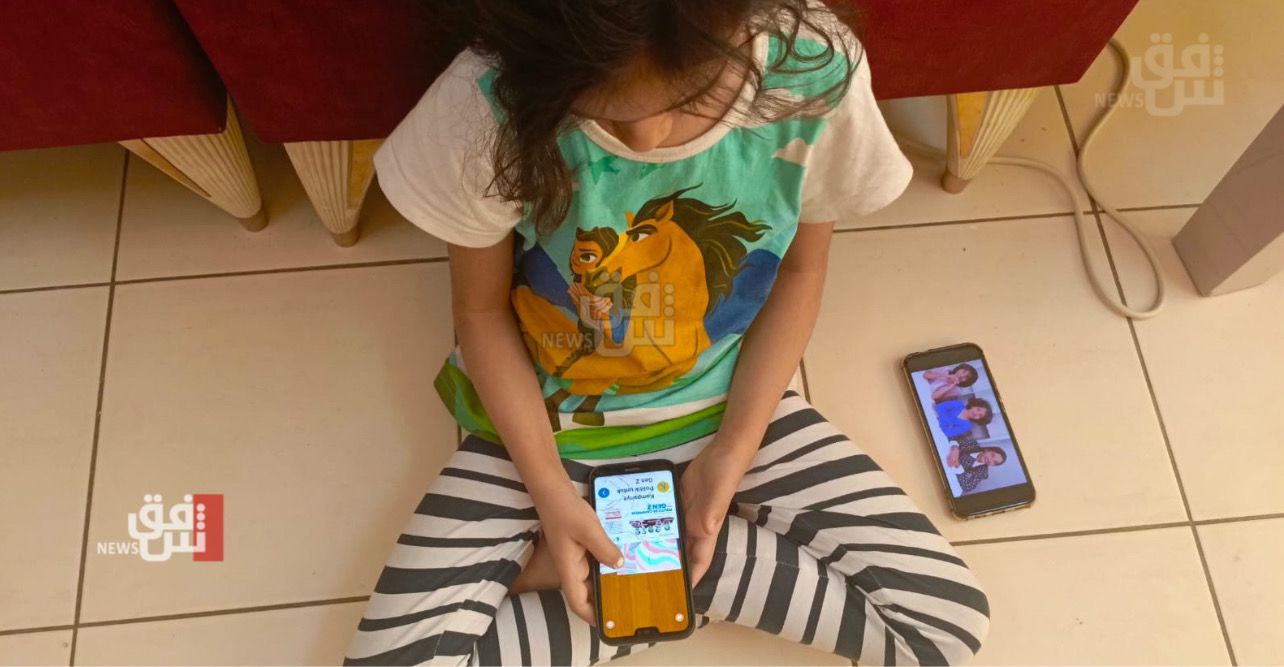"Time Bombs" in Iraqi children's hands: health and academic institutions sound alarm

Shafaq News/ Health and academic institutions across Iraq are raising urgent warnings about the growing use of mobile phones and electronic devices among children, particularly those under six. Labeled as "time bombs," these devices are linked to a rise in health issues such as strabismus and poor cognitive performance, with experts warning of potential long-term societal consequences, including family breakdowns and developmental disorders.
Medical Warnings
On August 20, Dr. Walid Hamid Jassim, Director of Ibn Al-Haytham Eye Hospital, revealed to Shafaq News that there had been a 50% increase in cases of strabismus and refractive errors in children under six. He explained, "While there are no precise statistics on the number of affected children, the cases have doubled compared to previous years, based on observations from the hospital's strabismus unit, the only one of its kind in Iraq, at Ibn Al-Haytham Eye Hospital."
Dr. Jassim attributed this rise to the excessive use of mobile phones and electronic devices, often given to children by their families at an early age. He added, "The negative impacts on children include reduced physical activity, obesity, decreased cognitive performance, and an increase in autism cases as children become detached from the real world."
He further explained that certain types of strabismus worsen with device use due to the strain on the eye muscles. In some instances, latent strabismus in children becomes visible due to prolonged use of these devices. He also noted additional adverse effects for adults, such as dry eyes, muscle spasms, and other related issues.
In a previous statement to Shafaq News, ophthalmologist Dr. Mohammed Hamza highlighted the detrimental effects of electronic devices on eye health. "Prolonged use of devices at distances shorter than 35 centimeters leads to chronic dryness, corneal swelling, redness, and frequent eye infections. It also increases the risk of internal strabismus due to extended focus on a close point," he said.
Dr. Hamza recommended that children under ten should limit their use of smart devices to no more than one hour per day, split between morning and evening. He advised using distant screens, such as televisions placed three meters away, for educational purposes or games. For children over ten, usage should not exceed two hours per day, based on necessity.
Warn of Growing Risks for Children
According to UNICEF statistics, more than 175,000 children access the internet for the first time each day—equivalent to a new child every half second. The UN agency dedicated to child welfare has cautioned that while digital access offers numerous opportunities and benefits, it also exposes children to a wide array of risks and harms. These include access to harmful content, sexual exploitation and abuse, cyberbullying, and the misuse of their personal information.
A report released on May 1, commissioned by French President Emmanuel Macron, also raised alarms about children's use of digital devices. The report emphasized that children should not be allowed to use smartphones until the age of 13, and access to traditional social media platforms like TikTok, Instagram, and Snapchat should be prohibited until they turn 18.
The report, described as "strongly worded," stressed the need to protect children from the tech industry's profit-driven strategies to capture and exploit their attention. These strategies employ various cognitive biases to keep children engaged with screens, control their behavior, and monetize their time spent online.
Additionally, the report recommended that children under the age of three should not be exposed to screens, including television. It also advised that no child under 11 should have a phone, and any device given to children between the ages of 11 and 13 should be restricted from internet access. The minimum age for children to have a smartphone with internet connectivity, the report concluded, should be 13.
A Double-Edged Sword
In an interview with Shafaq News, social researcher Samar Al-Faili described mobile phones and electronic devices as a "double-edged sword." She explained, "These devices can enhance children's intelligence and foster creativity in certain areas. On the other hand, children are exposed to content that may not be appropriate for their age."
Al-Faili emphasized that families bear much responsibility due to their lack of attention and awareness, allowing children to spend long hours in front of screens. "There is no harm in children using these devices and social media, but it must be under parental supervision and limited to one or two hours daily," she noted, acknowledging the positive aspects, such as children learning to draw or improving their English skills through these platforms.
However, Al-Faili warned of the dangers posed by electronic games, stating that they can lead to addiction and damage children's eyesight if parents do not intervene. "A child's vision can weaken or even deteriorate entirely. Reports also highlight other harms, including issues with hand and finger movement due to prolonged gaming addiction, which is extremely dangerous for children," she added.
Social Disasters Due to Children's Mobile Game Addiction
Academic researcher Dr. Rafi Muaid Abdullah warned of severe social consequences from children's obsession with mobile games.
In an interview with Shafaq News, he explained, "We are facing significant social risks for families due to children's excessive use of mobile devices," he stated.
Dr. Abdullah pointed out that some mothers neglect their children by focusing on social media, beauty centers, and online shopping, leaving them with mobile phones for extended periods without supervision. "The first issue these children will face, given their unregulated screen time, is autism," he cautioned.
He shared a personal experience involving a colleague who runs a center for autism treatment, confirming that there has been a noticeable increase in autism cases among children linked to excessive use of mobile devices and electronic gadgets.
Dr. Abdullah stressed that the harm doesn't only affect the child but also disrupts social dynamics within the family. "These issues can create tension between parents, often leading to accusations over the lack of child supervision. In some cases, this can escalate to divorce and family breakdown," he explained.
He concluded by noting that the strain on relationships between spouses often begins before and continues after a child is diagnosed, highlighting that these "social disasters" are rarely acknowledged until they cause irreparable damage.
Mental Strabismus
Dr. Ahmed Al-Dhahabi, a member of the Psychological Research Center at the University of Baghdad, revealed in an interview with Shafaq News that the university introduced a course four years ago for its master's and PhD students on Internet Psychology. This course explores the medical harms of the internet on children, such as spinal deformities from prolonged sitting and the inability to develop a strong personality or interact with society effectively.
Al-Dhahabi emphasized, "There is a real need to educate parents before educating children. At the Psychological Research Center, we conduct intelligence tests for children, particularly from elementary through middle school, and we found that their intelligence levels were very disappointing due to internet addiction."
He added that the medical effects on children include red eyes, spinal deformities, and another alarming trend: children who spend long hours on tablets and mobile phones are either underweight or obese, as many spend more than ten hours a day on the internet. "Mental strabismus parallels visual strabismus," he explained, citing data from intelligence assessments conducted at the center.
The academic expert underscored the importance of setting rules to prevent children from overexposure to the internet and social media. "Parents must establish a schedule for turning the internet on and off, rather than leaving it open constantly, as many children stay awake until morning without their parents' knowledge," he said. He also stressed the need for continuous communication between parents and children to ensure proper values are instilled and children's ideas are heard.





